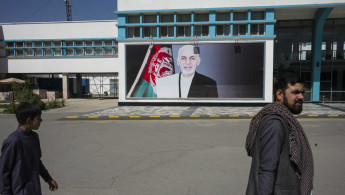Afghanistan to release senior Taliban officials in exchange for US, Australian hostages
The three Taliban prisoners include Anas Haqqani, who was seized in 2014 and whose older brother is the deputy Taliban leader and head of the Haqqani network, a notorious Taliban affiliate.
"We have decided to conditionally release three Taliban prisoners who... have been in Bagram prison in the custody of the Afghan government for some time," Ghani said in an announcement at the presidential palace.
He did not specify the fate of the Western hostages - an Australian and an American - and it was not clear when or where they would be freed.
But Ghani noted in his speech that "their health has been deteriorating while in the custody of the terrorists".
He added that the release of the two professors would "pave the way" for the start of unofficial direct talks between his government and the Taliban, who long have refused to negotiate with Ghani's administration.
Ghani, flanked by his top security advisors, said the decision to release the three Taliban prisoners had been "very hard and necessary".
In August 2016, gunmen wearing military uniforms kidnapped two professors of the American University of Afghanistan in the heart of Kabul.
The two, American Kevin King and Australian Timothy Weeks, later appeared looking haggard in a Taliban hostage video, with the insurgents going on to say that King was in poor health.
Read more: CIA-backed 'death squads' accused of Afghanistan 'war crimes'
The elite American University of Afghanistan opened in 2006 and has attracted a number of faculty members from Western countries.
The US and the Australian embassies in Kabul declined to provide immediate comment. American University also did not comment.
Follow us Twitter and Instagram to stay connected





 Follow the Middle East's top stories in English at The New Arab on Google News
Follow the Middle East's top stories in English at The New Arab on Google News
![Israeli forces ordered bombed Gaza's Jabalia, ordering residents to leave [Getty]](/sites/default/files/styles/image_330x185/public/2176418030.jpeg?h=a5f2f23a&itok=_YGZaP1z)

